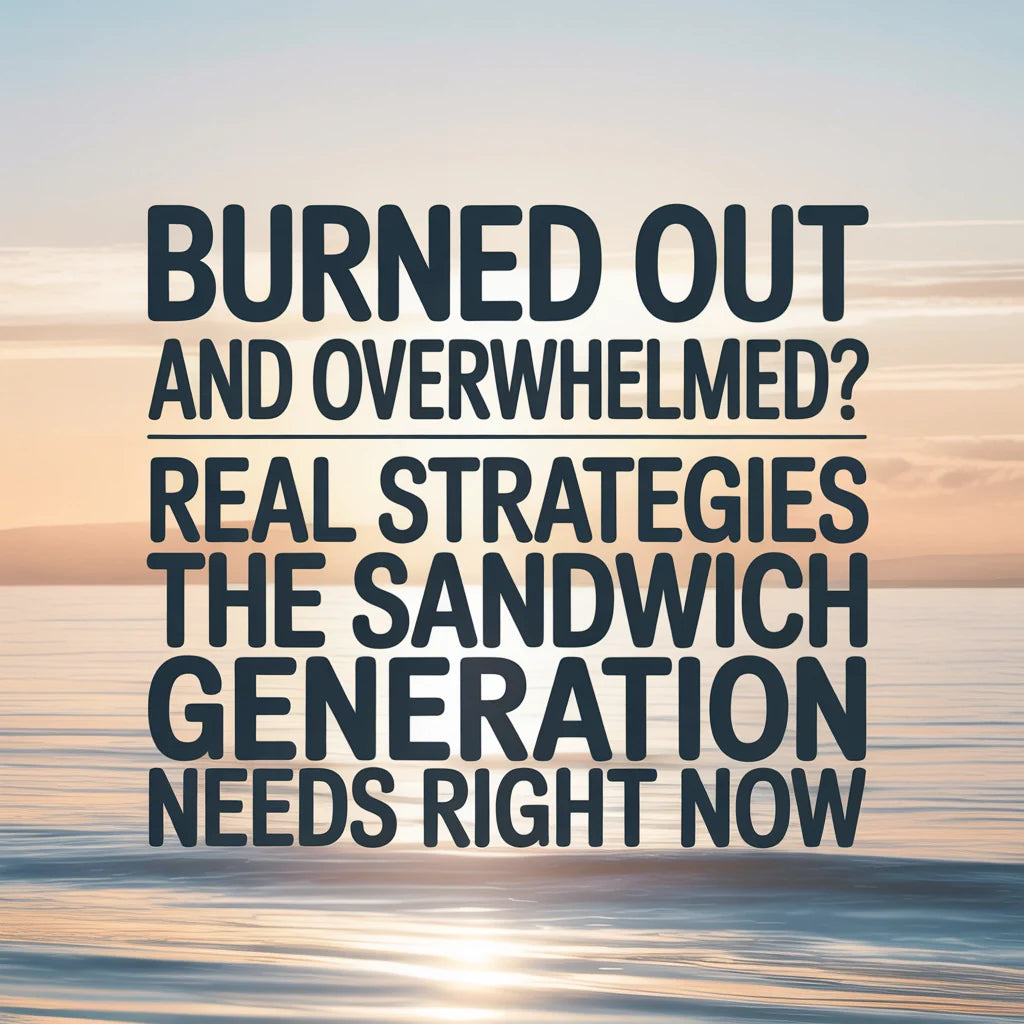If you’re sandwiched between raising kids and caring for aging parents, you’re in one of the toughest jobs there is—no cape or superhero suit required. You juggle soccer schedules with doctors’ appointments. You help with math homework after spending hours organizing Dad’s prescriptions. And if you’re feeling like the meat in the middle is a little overcooked (aka, burned out), you’re not alone. In fact, over 11 million Americans are in your shoes, and studies show that 41% of sandwich generation parents feel so stressed they can barely function most days.
But you can find breathing room—and some actual joy—in the chaos. Here’s how.
The Hidden Strain: Sandwich Generation Stress is Real
While being a multi-generational caregiver can be deeply rewarding, the pressure is real and relentless. What causes that draining exhaustion? Let’s break down the most common culprits:
- Chronic Stress: There’s always something urgent vying for your time and attention.
- Caregiver Burnout: Supporting children and aging parents leaves little time for yourself.
- Guilt: You never feel like you’re doing enough for either side, and taking time off for yourself often comes with a side of guilt.
- Isolation: Family demands crowd out friendships, hobbies, and sometimes even your partner.
- Financial Burden: Supporting both your kids and parents means time and resources are always stretched.
It sounds grim, but these issues are not just your “new normal.” Recognizing them is the first step to taking back control—and making changes for the better.

1. Name—and Challenge—Your Guilt
Most sandwich generation caregivers struggle with guilt. You may find yourself thinking:
- “I should be more patient.”
- “I shouldn’t wish I had more time for myself.”
- “I should be there for every event, appointment, or emergency.”
Start by acknowledging those thoughts. Write them down, talk them out, or share with a supportive friend. Often, the “shoulds” are impossible standards.
Ask yourself:
- Are these realistic expectations?
- Would I ask a friend to live up to the same?
- Am I doing the best I can with what I have?
Remember: Self-compassion isn’t self-indulgence; it’s self-preservation.
2. Make Leisure Non-Negotiable
You might feel like there’s no time for fun, rest, or hobbies—but that mindset sets you up for faster burnout and more stress.
Why Does Leisure Matter? Regular enjoyable activities:
- Decrease chronic stress and anxiety
- Boost confidence and positive energy
- Increase life satisfaction
How to Make It Happen:
- Keep it simple: Read for 20 minutes. Bake a favorite family recipe. Dig in the garden.
- Schedule it: Block “me time” on your digital calendar and guard it like an appointment.
- Stay consistent: Small daily pleasures, not just big occasional events, refill your energy.
If you’re struggling for ideas, we’ve shared a few of our favorite quick, calming breaks on our Resources Page.

3. Build Realistic Routines (and Let Stuff Go)
Trying to control everything leads to overwhelm. Instead:
- Pick your battles: Assign chores by age/ability, and let go of perfection (no, not all laundry has to be neatly folded!).
- Batch tasks: Handle bills, prescriptions, or school papers in dedicated time blocks. That way, you’re not always multi-tasking.
- Ask for help: Siblings, friends, neighbors, even the school carpool committee—requesting help is a sign of wisdom, not weakness.
4. Seek Workplace Flexibility
Sandwich generation burnout can hit your career hard. Many organizations now recognize caregiver challenges—and may offer flexible schedules, remote work options, or even paid family leave. Don’t be afraid to have a frank, proactive talk with your manager about your needs.
Some employers offer Employee Assistance Programs (EAPs), counseling referrals, or support groups for caregivers. If you’re unsure what’s available, HR is a good starting point.
5. Talk to a Professional—You Deserve It
Professional support is a lifeline, not a last resort. If guilt, anxiety, or exhaustion feels constant, reach out:
- Therapists can help you work through negative thought patterns and set boundaries.
- Support groups (online or in-person) let you connect with others who “get it.”
- Coaches or family mediators can assist with challenging conversations and planning.
You can find local and virtual support options on our Resources Page.
6. Tackle the Financial Strain
Supporting two generations can bring on some serious money stress. Here are a few quick wins:
- Set up a family budget and automate bill payments for both parents and kids.
- Look into community resources or government programs for eldercare and childcare assistance.
- Talk to a financial counselor or free local agency for tailored advice.
And don’t forget: You’re not alone. Sometimes a friend or relative can help research assistance programs or sit with your loved ones while you manage paperwork.

7. Commit to Connection—Even When You’re Short on Time
Isolation is a huge risk factor for caregiver burnout. Instead of waiting for the “perfect” time for get-togethers:
- Text a friend while waiting at school pick-up.
- Join an online community for caregivers.
- Invite neighbors for coffee, even for just half an hour.
Tiny, frequent social connections make a bigger impact than occasional big events.
8. Prioritize What Matters Most (and Let Go of the Rest)
It’s impossible to be all things to all people. At Essential Home Organization, LLC, we believe in the value of intentional living:
- Identify which tasks and rituals matter most (Sunday family dinner? Quiet bedtime routines? Parent’s medication check?)
- Consciously release (or delegate) the less important ones
If you need guidance on building personalized systems, our consulting team is here to help.
You’re Not Alone—And You Don’t Have to Do It All
The sandwich generation faces pressures like never before. But remember: help, support, and resources exist. Whether you reach out to a professional, connect with friends, ask for workplace help, or simply learn to forgive yourself for being human, you’re building a stronger, sustainable foundation for your entire family.
Most importantly: Give yourself credit, take care of your health, and don’t let guilt be the loudest voice in the room. You—and your loved ones—deserve a caregiver who thrives, not just survives.
Want more caregiver support tips and organization tricks? Visit our blog or reach out directly—we’re here for you.

